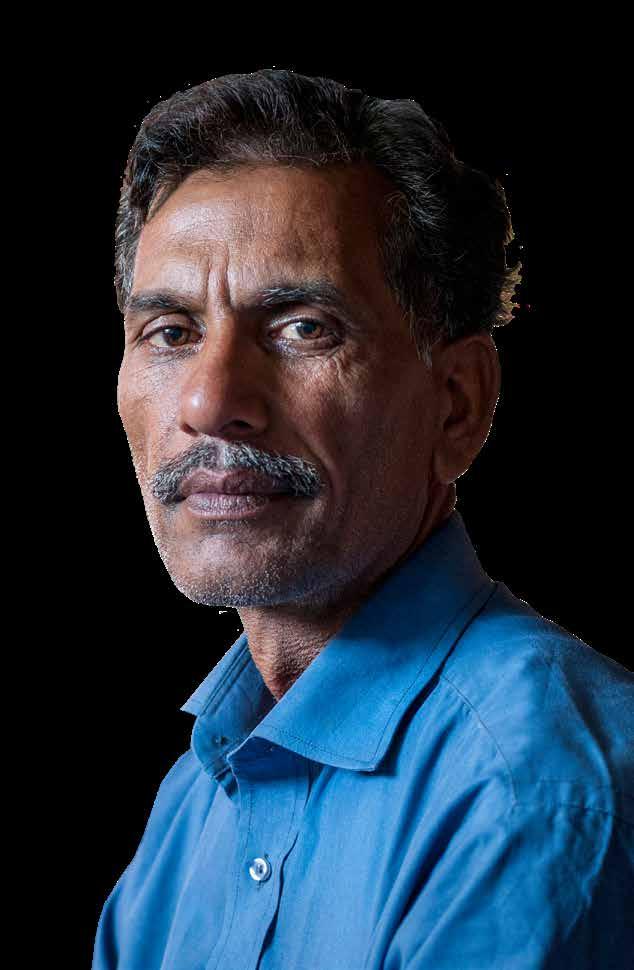
34 minute read
Context statistics
2019-20 Statistics
700,000
APPROXIMATE NUMBER OF AUSTRALIANS WHO HAVE EXPERIENCED INCOME POVERTY FOR AT LEAST FOUR YEARS
62
NUMBER OF DOCTORS COVERING 6.8 MILLION PEOPLE IN RURAL AND REMOTE PAPUA NEW GUINEA
57
PERCENTAGE OF CLIENTS OF OUR ASYLUM SEEKER HEALTH SERVICES WHO ARE NOT ELIGIBLE FOR MEDICARE
67
PERCENTAGE OF ESWATINI’S HIV INFECTIONS THAT OCCUR AMONGST FEMALES AGED 15-49 YEARS
MORE THAN 1 in 6
NUMBER OF VICTORIAN CHILDREN LIVING IN POVERTY
37,000
APPROXIMATE NUMBER OF PEOPLE AWAITING A PROTECTION CLAIM IN AUSTRALIA WHO DO NOT HAVE ANY INCOME SUPPORT
1000+
NUMBER OF WOMEN WHO DIE EACH YEAR FROM CERVICAL CANCER IN PAPUA NEW GUINEA
470
NUMBER OF MATERNAL DEATHS IN ETHIOPIA PER 100,000 LIVE BIRTHS
200,000
NUMBER OF PEOPLE IN ESWATINI LIVING WITH HIV
Activities and Impact – Program Areas
01.
1050
NUMBER OF PRO BONO HOURS WORKED BY GENERAL PRACTITIONERS, PSYCHIATRISTS, PHYSIOTHERAPIST FOR ASYLUM SEEKER HEALTH SERVICES IN FY20
$74,500
AMOUNT SPENT ON PHARMACY AND HEALTH WAIVERS FOR PEOPLE SEEKING ASYLUM IN FY20
55
PERCENTAGE OF CLIENTS OF OUR ASYLUM SEEKER HEALTH SERVICES WHO HAVE A MENTAL HEALTH DIAGNOSIS
Asylum seeker and refugee health program
Around 50,000 people are currently living in communities across Australia awaiting a decision on their claim for protection.
The 2019-20 financial year was a busy one for our asylum seeker and refugee health program, and a very difficult one for our clients. Around 37,000 of the 50,000 people across Australia awaiting a protection claim have work rights, but no access to income support. When the COVID-19 pandemic hit, large numbers of people seeking asylum lost employment and, being ineligible for government support, had no other means by which to pay for food and housing. Emergency hardship payments and material aid were the only means by which they could survive. Like many other services and businesses, the COVID-19 pandemic compelled us to change the way we delivered our services to people seeking asylum. We rapidly implemented telehealth capabilities into our service system, enabling us to continue to deliver our primary health and mental health services to the majority of clients while keeping them and our staff safe. At the same time, the Cabrini Asylum Seeker and Refugee Health Hub remained open for clients whose healthcare needs required an in-person consultation and for those without the means to access telehealth. Over the course of the year, our primary health nurses, general practitioners, physiotherapist, mental health clinicians, psychiatrists and psychiatry registrar and
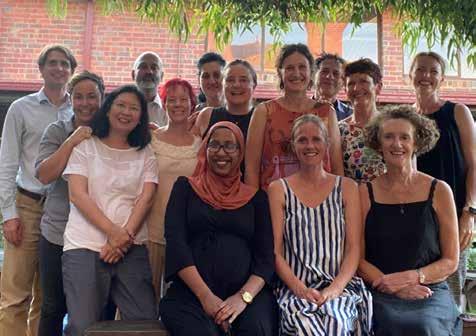
clinical psychologists delivered more than 7000 hours of service across these two delivery modes. We are grateful to Cabrini Health for supporting our pivot to telehealth delivery and in providing appropriate Personal Protective Equipment (PPE) to enable our health practitioners to safely continue to work with our clients. Our health and pharmacy waiver program, which provides free essential medicines and other medical devices to people seeking asylum, also pivoted to online delivery. Not surprisingly, as the pandemic spread, we saw an increase in people seeking health and pharmacy waivers. Due to the number of people reaching out to us for support and our reputation for delivering quality care, we were fortunate to receive funding support via two Victorian Department of Health and Human Services (DHHS) programs. Stepping in to support people seeking asylum provided additional funding to support the expansion of our mental health service for people seeking asylum to the western corridor of Melbourne. The Keeping Victorians Connected and Supported – Mental Health and Wellbeing Coronavirus Response Package will help us meet the escalating mental health and psychosocial support needs of people seeking asylum and other temporary visa holders in Melbourne and will enable us to expand our services into regional Victoria. Our advocacy for access to Medicare for people seeking asylum continued strongly over the year. We worked both individually and in conjunction with the Refugee Council of Australia and Catholic refugee and social services to call for equitable access to Medicare, regardless of visa status. Our asylum seeker health research program also continued to make great strides towards its goals. We integrated STAR-MH – a research validated tool to screen for post-traumatic stress disorder and major depressive disorder in asylum seeker and refugee populations – into our referral process. We also supported other agencies that refer to us to build their capacity in the use of the tool. We were successful in obtaining two philanthropic grants related to the STAR-MH tool. One will support initial development of an online version of the tool (with the eventual intention for offline capability to be built in to address internet access issues), and the second will extend the STAR-MH into three additional languages of critical global and Australian significance: Bengali, Burmese and Rohingya. Many people are involved in enabling our services. We would like to extend a huge thank you to the general practitioners, physiotherapist and psychiatrists who provided many hours of pro bono service at the Asylum Seeker and Refugee Health Hub over the year, to the Cabrini staff and friends who have contributed funds through workplace giving and local fundraising events and to all those who have contributed in-kind services. Their generosity enables us to deliver the quality service we are proud to provide to people seeking asylum and their families.

Over the course of the year our primary health nurses, general practitioners, physiotherapist, mental health clinicians, psychiatrists and psychiatry registrar and clinical psychologists delivered more than 7000 hours of service.
Providing holistic primary and mental health care for some of the most vulnerable people in our communities
When Maya* fled to Australia to escape physical and sexual violence in her home country, she was forced to leave her three children behind with her sister. She hoped that the process of applying for protection would not take long, but soon realised it could take years.
Now, while struggling to deal with the trauma of the years of violence she suffered, Maya is also heartbroken at what has become a two-year separation from her small children. Many people seeking asylum in Australia find themselves in this position. They flee the violence or persecution of their home country with hope for a better future, only to find themselves experiencing more trauma, fear and uncertainty in their country of arrival. This is reflected in the majority of clients we see at the Cabrini Asylum Seeker and Refugee Health Hub who have a diagnosable mental illness. Many also suffer from chronic disease, including diabetes and cardiovascular disease. These conditions are exacerbated by the physical and psychological impact of living in destitution and of being separated from loved ones, as Maya has been. Many people seeking asylum fear people of authority, making them reluctant to seek support for their health needs. Others are simply unaware that support exists. For those who are desperate enough to seek out support, health services – particularly mental health services – are extremely limited for those not eligible for Medicare, and are often inadequate for such complex needs. Our Asylum Seeker and Refugee Health Hub specialises in providing holistic primary care and a multidisciplinary mental health service for people seeking asylum. Our refugee health nurses, general practitioners and physiotherapist have specialist expertise in assessing and treating the needs of people seeking asylum, as do our mental health clinicians, psychologists and psychiatrists. When our refugee health nurses reached out to Maya, they discovered she had run out of medication for her health conditions. They organised a home visit, provided a flu vaccination and organised scripts for her medication. They also set up a telehealth appointment with one of our GPs and a weekly video consultation with a mental health clinician to assist Maya to work through her past and present trauma. Without the services of the Hub, people like Maya would find themselves in exceedingly desperate situations, unable to access the most basic of healthcare needs that Australians take for granted.
*Name changed to protect identity
Pharmacy Waiver program provides much-needed relief for people seeking asylum during COVID-19 pandemic
Abbad* knows how it feels to worry about his family’s health. He has two children with disabilities and one child with asthma, and he and his family are living on the edge of poverty while they await the outcome of their protection claim in Australia.
It is why Abbad is so grateful for the Cabrini Outreach Pharmacy Waiver program, run in partnership with Hume Whittlesea Community Connections. The Pharmacy Waiver program provides free, essential medicines to people seeking asylum who are not eligible for Medicare or who have no or low income. Abbad is not eligible for support from the Australian government, and so he relies on this program to maintain his and his family’s health. “Honestly, without the free medication, my family would be facing many more problems both in the house and financially. Our health would be much worse and we would get sick much more often,” Abbad commented. “I cannot thank you enough. This program has saved us.” During the COVID-19 pandemic, the Cabrini Asylum Seeker and Refugee Health Hub has seen a doubling in the number of people seeking support from the Pharmacy Waiver program. Many of our clients suffer from chronic disease, placing them at higher risk if they were to be infected with the coronavirus. Many are also living in the current Melbourne COVID-19 ‘hotspot’ suburbs. Cabrini Outreach, in collaboration with the Australian Red Cross and the Asylum Seeker Resource Centre, will continue to provide relief for medication costs for people seeking asylum, to work towards ensuring that everyone in Australia can maintain basic standards of health.

*Name changed to protect identity
Screening tool for asylum seeker and refugee populations supports identification of mental health problems
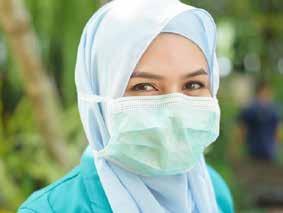
The Screening Tool for Asylum Seeker and Refugee Mental Health (STAR-MH), developed by research team Dr Debbie Hocking and Professor Suresh Sundram, continues to be taken up by the refugee resettlement and refugee health sectors. This screening tool is designed to assist non health workers to screen for likely mental disorders in adult asylum seekers and new refugees. The STAR-MH has been translated into six languages other than English and is embedded in the refugee health assessment at Cabrini Asylum Seeker and Refugee Health Hub and other agencies who care for asylum seekers and refugees, such as the Asylum Seeker Resource Centre, the Hoppers Crossing and Sunshine IPC refugee health programs and the IPC GP practices at Deer Park and Wyndham Vale. It will also soon be incorporated into the intake process for Cabrini Immigrant Services, New York City (USA) with their predominantly Spanish-speaking population. Additionally, a mental health screening tool for asylum seeker and refugee adolescents is being developed, with the first phase having been completed. Newly arrived refugee adolescents were recruited through English language schools in Melbourne’s inner and outer western suburbs. The findings of this initial phase are currently being prepared for publication in an international journal.
8–9
THE AVERAGE NUMBER OF YEARS LOWER LIFE EXPECTANCY FOR INDIGENOUS AUSTRALIANS
12
THE NUMBER OF ABORIGINAL-LED INITIATIVES CABRINI OUTREACH HAVE SUPPORTED SINCE 1994
64
THE PERCENTAGE OF THE BURDEN OF DISEASE AMONG INDIGENOUS AUSTRALIANS THAT IS DUE TO CHRONIC DISEASE
Supporting better health for Australia’s First Peoples
Despite years of investment in ‘closing the gap’, Australia’s First Peoples experience significant marginalisation and disadvantage and this is reflected in the wide disparity in their health outcomes compared to non-indigenous Australians.
The health disparities suffered by Australia’s First Peoples are unacceptable. We understand strong culture and self-determination are intimately linked to improving the health outcomes and wellbeing of Aboriginal and Torres Strait Islander Peoples. We also know that the social determinants of health – the conditions in which people are born, grow, live, work and age – are mostly responsible for health inequities. Since 1994, we have been playing our part in closing the gap by working with Aboriginal controlled organisations and others who are investing in building the capacity of Aboriginal leaders and communities. We have supported more than 12 Aboriginal-led health-focused initiatives, with our current relationships consisting of the following:
Mpwelarre Health Service (Santa Teresa Health Centre)
Cabrini’s introduction to the Santa Teresa community began in the mid 1990’s and has continued for over 20 years. The health centre, originally run by the Cluny Sisters, reached out to Cabrini for assistance with holiday staffing. This led to a nursing placement program over the December-January holidays where Cabrini nurses could
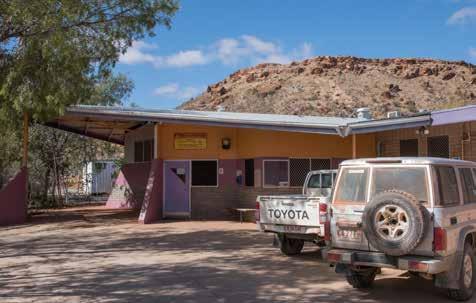
Cabrini Outreach has had a long relationship with the Aboriginal community in Santa Teresa, 85km south-east of Alice Springs in the Northern Territory.

cover the leave in Santa Teresa while improving their nursing skills in a new environment. When the clinic was handed over to the local community, the placement program went into hiatus. In 2004, Ltyentye Apurte Aboriginal Council reached out to Cabrini to assist in staff shortages at the clinic. Two programs were launched, one involving a voluntary placement to provide an experience in remote nursing skills and the second for short term contract positions involving Cabrini giving the employee leave without pay during the contracted position. The longest contract placement was for 15 months. Cabrini also provided material aid (including knitted scarves and hats made by residents at Cabrini Ashwood) and biomedical advice. The program again fell dormant following the institution of regional health services. It was revived again in 2017, with another call for staff, and was incorporated into the Catholic Health Australia (CHA) Workforce Exchange Program. The most recent Cabrini-sponsored exchange was in 2018.
Apunipima Cape York Health Council
From 2017 to 2019, we provided grant funding to the Apunipima Cape York Health Council to fund a research coordinator position. The project is co-funded by CHA, with matched funding from Apunipima. The goals of the research role are to facilitate quality research for the benefit of the remote communities in Cape York, enable the establishment of research administration processes and support translation of research findings. In 2019, we provided a scholarship to enable the research coordinator to present at the Cabrini Institute’s research symposium. We were also founding members of the CHA – Apunipima workforce exchange program, established at Apunipima’s request to assist in meeting workforce shortages. In 2018, Cabrini Outreach was contacted to support community members who had been injured following a car accident. Cabrini Technology Group donated equipment such as mobility aids and crutches, and two Cabrini Health allied health professionals spent two weeks in the community assisting with orthopaedic rehabilitation. Under our previous status, when Cabrini Outreach was primarily a grant-maker, we provided a number of grants to Aboriginal-led organisations and initiatives in Victoria. Though these have since been wound up, we are keen to develop future partnerships with Aboriginal-led organisations or initiatives within Victoria, to complement our interstate partnerships. The concepts of mutual respect and mutual obligation are important to us, in developing new partnerships. We believe partnerships should be progressed on the basis that each organisation has something to offer to and learn from the other. We are conscious of being purposeful about why a partnership might be necessary and what we hope the partnership will achieve. We believe we have much to offer from a technical health and resource perspective and we have much to learn from Aboriginal culture, particularly the connection between country, spirituality, health and wellbeing. Working together in a way that supports Aboriginal self-determination is at the heart of our commitment to reconciliation.
65
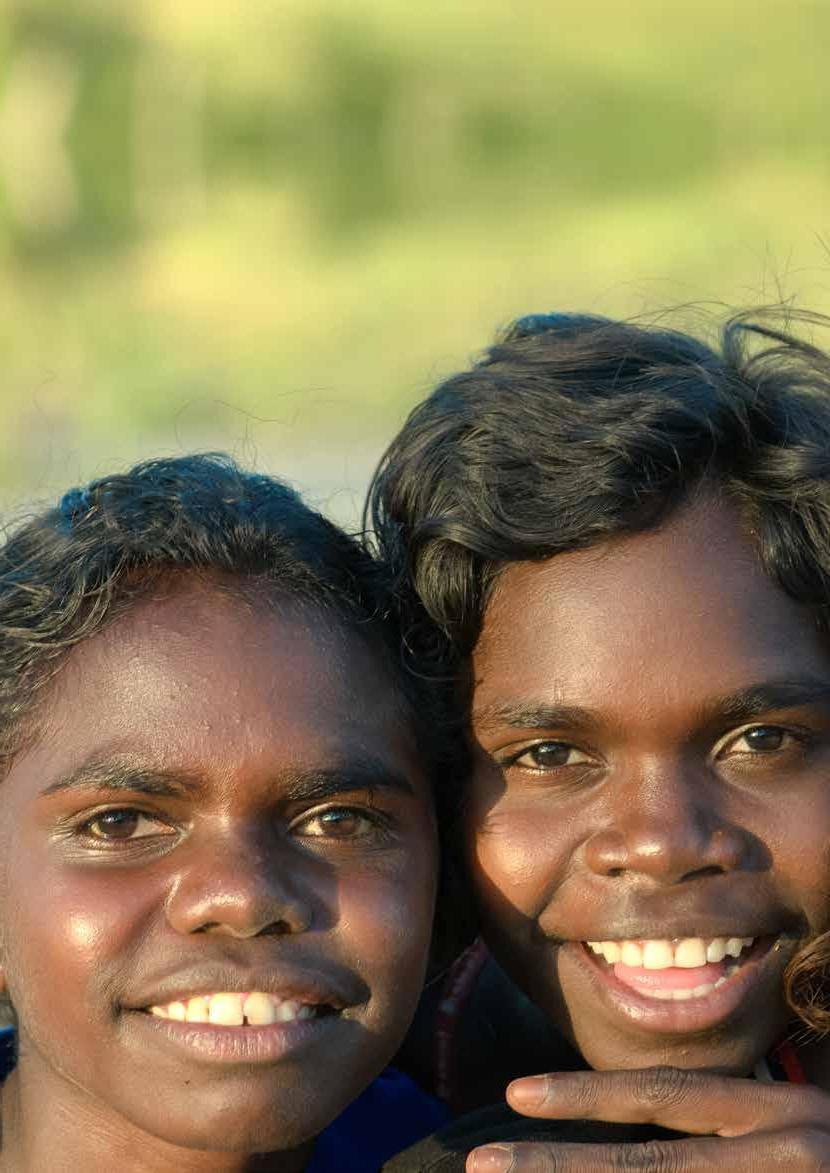
PERCENTAGE OF DEATHS AMONG INDIGENOUS PEOPLE THAT OCCUR BEFORE THE AGE OF 65
1,000,000
THE NUMBER OF PEOPLE WHO EXPERIENCE DEEP SOCIAL ISOLATION OR EXCLUSION IN AUSTRALIA EACH YEAR
700,000
THE APPROXIMATE NUMBER OF AUSTRALIANS WHO HAVE EXPERIENCED INCOME POVERTY FOR AT LEAST FOUR YEARS
774,000
THE NUMBER OF VICTORIANS LIVING IN POVERTY
Entrenched community disadvantage
Despite Australia’s status as a prosperous nation, too many individuals and families continue to experience entrenched disadvantage and social exclusion.
Entrenched disadvantage and social isolation or exclusion is an often hidden but very real feature of the Australian socio-economic landscape. For a number of reasons – often complex – families, individuals and people in particular locations can become locked into adverse economic and social circumstances, and these circumstances have a significant effect on health and wellbeing. Estimates of the number of people experiencing entrenched disadvantage and social exclusion vary, depending on the definitions used. But for a country with a relatively low population, the numbers are quite startling. Around 700,000 Australians have experienced income poverty for at least four years and around 1,000,000 Australians experience deep social isolation or exclusion each year. Additionally, people in certain groups are more likely to experience social exclusion – including women, people aged over 65, migrants from non-English speaking countries, Aboriginal and Torres Strait Islander people and people with a disability or long-term health condition. Over the past year, we have continued our commitment to addressing entrenched community disadvantage in Victoria.

Despite significant investment, the most disadvantaged communities have remained in the bottom 10th percentile for disadvantage for the past two decades.

Along with St Joseph’s Catholic Parish in Malvern, we continue to sponsor JoCare, a volunteer-based service that aims to improve neighbourhood connectedness and reduce the isolation of members of the Stonnington community in Melbourne. JoCare volunteers provide acts of service for people living independently in the area experiencing social isolation. The service has been particularly vital during the pandemic, despite the service having to move from in-person visits to telephone calls. Around 1500 neighbourhood visits (or calls) have been conducted by JoCare since 2015, by approximately 26 volunteers who actively contribute to JoCare’s neighbourhood program. We provide a grant enabling JoCare to remain a free service and sit on the steering committee to support JoCare’s strategy and direction. The persistent and complex nature of entrenched disadvantage means that new approaches to addressing disadvantage are needed. Cabrini Outreach has partnered with CatholicCare and Catholic Education Melbourne to co-design, with community, a collective impact approach to address entrenched disadvantage in the Victorian suburb of Melton South, City of Melton. Melton is one of the fastest growing local government areas in Australia. It faces challenges similar to other growth corridors, particularly in relation to the availability of local services and infrastructure, including transport. Melton’s overall unemployment rate is 25 per cent higher than the Victorian average and the level of workforce participation is 15 per cent lower than the Victorian average. The percentage of low income and welfare dependent families with children is approximately 20 per cent higher in Melton than in the metropolitan Melbourne area. The community and health service system in the North Western Melbourne Primary Health Network region is recognised as one of the most complex in all Primary Health Network regions across Australia. Community members have indicated that it is difficult to navigate this service system to obtain the support they need, and there is also a documented under-supply of key local health services. Drawing on community consultation conducted over the past year, we are seeking to implement services designed to fill gaps identified by local families, with a focus on supporting family relationships, family wellbeing, and facilitating strong links between families and local Catholic primary school, St Anthony of Padua.
Joining up health, education and social services to address intergenerational disadvantage in Melton South
Cabrini and CatholicCare have worked together for 28 years. In the development of the current strategic focus for both organisations, it was identified that positive outcomes for families would be better achieved if the factors that led to entrenched disadvantage were disrupted. We approached Catholic Education Melbourne (CEM) to help us determine a community that might benefit from us working with them. We later invited CEM to join the partnership as we believe collaboration of the three service arms of the Church (health, social services and education) will be an important enabler for integrated and responsive services. The initiative aims to address the social determinants of health in Melton South, a suburb that has many characteristics that indicate entrenched disadvantage. A collective impact approach to change is at the heart of the collaboration, which means co-designing, with community, an effective, holistic and sustainable service response that contributes to the development of an inclusive and empowered community. Several early stages of the project have been completed, which led to the identification of St Anthony of Padua Primary School as the
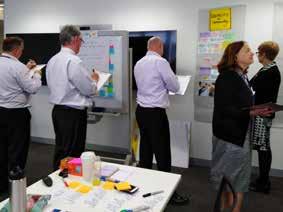
community around which a service response would be centred. Defining this school and associated community as the focus for our initiative will enable us to more clearly track changes over time. This does not, however, preclude the service response from ultimately being accessible to members of the wider Melton South community. During 2019-20, we completed phase 2 of the project, which involved community consultation to identify the community’s most pressing needs. We engaged The Australian Centre for Social Innovation to mentor us in this activity. The key findings of this phase of the project indicated that families have health support needs that are not being met, and that families are finding it difficult to navigate the service system. The next phase of the project will commence in the second half of 2020, and will result in community co-design of service responses to fill current gaps identified by the community. We are looking forward to moving into this next phase and to cementing our commitment to addressing disadvantage within the Melton South community.
0
NUMBER OF MATERNAL DEATHS AT ST MARY’S CATHOLIC PRIMARY HOSPITAL, ETHIOPIA IN THE LAST 12 MONTHS
491
THE NUMBER OF WOMEN SCREENED FOR CERVICAL CANCER BY CABRINI MINISTRIES ESWATINI
5500
THE NUMBER OF HIV-RELATED EPISODES OF CARE CONDUCTED BY CABRINI MINISTRIES ESWATINI
85
THE NUMBER OF CHILDREN SUPPORTED BY CABRINI MINISTRIES ETHIOPIA’S CHILD HEALTH AND NUTRITION PROGRAM
International development
ETHIOPIA
ESWATINI (FORMERLY SWAZILAND) PAPUA NEW GUINEA
We continued to work closely with our international partners in Eswatini (formerly Swaziland), Ethiopia and Papua New Guinea over the past year to orient our support to the most pressing needs of the local communities.
Our partnerships are directed to supporting the health of women and children and our specific goals are to: • increase immunisation rates for women and children to lower the unacceptably high rates of maternal and infant mortality • improve detection and treatment of cervical cancer • improve access to treatment for infectious diseases such as malaria, HIV and tuberculosis, focusing on the higher vulnerability of women and children • lower rates of child malnutrition and infection.
Eswatini
Cabrini Outreach has partnered with Cabrini Ministries Eswatini, which operates from St Philip’s Mission in the Lubombo lowveld region, since 2002. Cabrini Ministries’ services are designed to respond to the needs of the vulnerable local communities, where the average life expectancy is 58 years and around 63 per cent of people live below the poverty line. With funding and support from Cabrini Outreach, Cabrini
Cabrini Outreach’s Cath Garner and Tom Roth participating with Cabrini Ministries Eswatini’s leadership team at a strategic planning workshop.
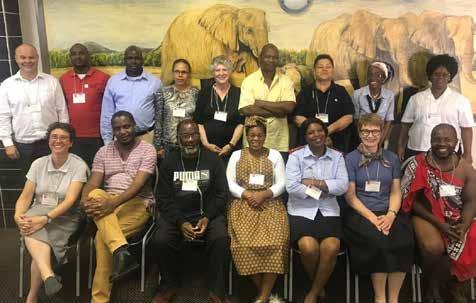
Ministries is contributing to improving health outcomes, largely through targeted prevention, treatment, care and support services relating to HIV. Cabrini Ministries reintroduced a comprehensive primary care health service in 2015, as the country has made great strides in turning around the HIV epidemic with improved access to HIV testing and provision of free antiretroviral treatment. For the prior decade, their health service efforts were focused on HIV and TB education, testing, counselling, treatment and follow-up. It is therefore notable that over the 2019-20 financial year, only 32 per cent of clients presented to Cabrini Ministries’ primary care clinic with HIV-related healthcare issues. While HIV/AIDS remains an issue in Eswatini, Cabrini Ministries has developed an international reputation for effective treatment initiation and compliance. Over the past year, 98 per cent of clients who tested positive to HIV were initiated on to antiretroviral therapy (ART) within 24 hours. Recognising the critical link between cervical cancer and HIV, Cabrini Ministries has prioritised the surveillance and screening, testing and treatment of cervical cancer, targeting women who have tested HIV positive and are on ART. A total of 491 female clients were screened for cervical cancer over the last financial year. Disability is another issue that has arisen out of the combined impact of poverty and HIV/AIDS. To address this, Cabrini Ministries launched a program to deliver services to people living with disability, most of whom were children. By 30 June 2020, a total of 51 children living with disabilities were accessing services through the program. Cabrini Ministries also sees many clients for other chronic conditions, including skin disorders, diarrhoea and upper respiratory conditions. In total, 17,931 clients visited the outpatient department over the year, and a further 18,414 clients in local communities received health education. In December 2019, Cabrini Ministries transitioned its childcare from hostels to family care in communities, while ensuring support for health services continued. Thanks to the generous support of staff who contributed to the Cabrini workplace giving program, a total of 35 food parcels were periodically distributed to families facing particular adversity.
Ethiopia
Over the 2019-20 financial year, Cabrini Outreach continued its partnership with St Mary’s Catholic Primary Hospital in Dubbo, Ethiopia, to progress our goal of supporting St Mary’s to improve maternal and child health outcomes. St Mary’s serves a population of approximately 300,000 and provides a significant service to the community with over 30,000 outpatient visits per annum, 6000 inpatients per annum and an average inpatient intake of 55 clients daily. In the St Mary’s catchment, family and societal practices coupled with a lack of health knowledge often contributes to delayed access to obstetric health services, especially in emergency health institutions. However, over the last financial year, St Mary’s reported 2,173 live births with zero maternal deaths recorded. Of these births, 174 babies were delivered by caesarean section and 560 clients were first time mothers. St Mary’s has achieved this outcome by focusing on the provision of good antenatal and postnatal care as part of their ‘Free Childbirth Program’. As a result, antenatal care appointments have increased from 3227 in 2017 to 6389 in 2019. With approximately 1118 women using the service over the 2019-20 financial year, that equates to around six appointments per person. In addition, all women presenting for antenatal and birth care received postnatal care, which included checking bleeding post-delivery and providing support and education on the importance of breast milk, signs of ill-health in newborns and good hygiene practices. The postnatal care sessions were also an opportunity to refer women and their babies to their local health centre for immunisation. St Mary’s also continues to provide care and treatment to children, most of whom are under five years of age. The most common reasons for children to present related to conditions such as pneumonia, diarrhoea and severe malnutrition. Children also presented for screening for HIV, tuberculosis and malaria. A total of 6322 patients were administered care by St Mary’s Hospital including 1784 children aged five years and under. Surgical intervention was required for 840 adult patients. Over the 2019-20 financial year, St Mary’s went through a change in leadership. Sr Maureen Bennett stepped down and was replaced by Bongani Khumalo

Cabrini nurse Jovie DeCoyna (left) with members of Cabrini Ministries Eswatini.
In line for maternal and child health services at Malala Health Clinic, Papua New Guinea.

as Interim Manager. Past Chief Executive of Cabrini Health, Dr Michael Walsh, stepped down from the St Mary’s Board and the Board went through a restructure. All change brings new opportunities and new challenges, and we aimed to provide as much support as practicable from afar as the new leadership team settled in to their roles.
Papua New Guinea
Despite its proximity to Australia, Papua New Guinea (PNG) faces significant global development challenges. The health system is under-resourced and deteriorating and maternal and child health outcomes are the worst in the Pacific region. Given Papua New Guinea’s close historical connection to Australia, we feel particularly called to reach out to our nearest neighbour. We have supported health-related programs in PNG for nearly two decades, with our strongest relationships in Madang Province. We currently partner with the government-owned Madang Provincial Hospital and, during the year, signed an agreement with Catholic Church Health Services (CCHS) in the Archdiocese of Madang to support primary health. Malala Health Centre was identified as an appropriate platform to begin strengthening and expanding primary health services in remote PNG. The focus was to be on maternal and child health, by working with CCHS to build local capacity and expertise and to promote midwife assisted deliveries. Only 53 per cent of PNG women have access to a skilled doctor or midwife when giving birth; the other 47 per cent give birth at home. The expansion of primary health also incorporated a vaccination program, to reduce mortality rates resulting from preventable disease. Following a successful grant application to the New Zealand Pacific Development and Conservation Trust, we were able to secure funds to purchase a vaccine refrigerator, medical ice-machine for vaccine transportation to outreach locations and a benchtop steriliser for the Malala Health Centre. In February 2020, with the support of Cabrini Technology Group (CTG), we sent a biomedical engineer to Madang Provincial Hospital to help test, diagnose and repair medical equipment in preparation for a planned orthopaedic service and education program. Although the program was not able to proceed due to COVID-19, CTG continues to remotely support the hospital’s biomedical engineering department as needed. In March 2020, we recruited a Primary Care Manager – Lana Webb – to provide clinical and administrative support in pursuit of our partnership goals with CCHS. Unfortunately, recruitment of this position coincided with the first COVID-19 lockdown and Lana was unable to travel to PNG. Despite not having a presence on the ground, Lana has continued to work with our PNG partners remotely, working to understand their needs and challenges, and investigating avenues for the provision of remote training and education. The research component of an innovative ‘test and treat’ cervical cancer program that we have been monitoring and supporting from the sidelines for a number of years is winding down. We hope to be able to support the program transition from operational research to an ongoing service with the goal of screening and treating up to 7000 women each year in an attempt to reduce PNG’s high burden of preventable cervical cancer.
Biomed trip to Papua New Guinea gets critical equipment up and running
When Cabrini Outreach needed someone to repair medical equipment in Papua New Guinea’s Madang Provincial Hospital, we knew we could call on Cabrini Technology Group. Greg Niedzielski is Cabrini Technology Group’s Regional Operations Manager for South Australia, Tasmania and the Northern Territory for the Chemtronics Biomedical Engineering division. Greg has more than 20 years biomedical engineering management and operational management experience across both private and public healthcare sectors and, importantly, he knows the developing country context. For many years, Greg has been using his annual leave to volunteer his time installing and repairing equipment at Da Nang’s Hospital for Women and Children in Vietnam. Despite already giving so much of his time, Greg was happy to put his hand up for the visit to PNG alongside Cabrini Outreach General Manager, Tom Roth. Greg’s task was by no means a small one. When our staff visited Madang Provincial Hospital in January – a 270-bed facility

servicing a population of more than 500,000 – they found three of four anaesthetic machines out of action, as were the operating lights in all four theatres. When critical medical equipment fails in a country like PNG, where the health system is already under enormous strain and resources are scarce, patient health outcomes and lives are put on the line. During Greg’s four-day visit, he and PNG biomedical engineers Samuel and Brendon went above and beyond to complete a truly remarkable volume of work. In addition to repairing the anaesthetic machines and theatre lights, they repaired or diagnosed for follow-up repair problems relating to the oxygen manifold (used to supply oxygen to the hospital), oxygen alarm, tourniquet machine, X-ray machine, ICU ventilators, vacuum pump system, blood analyser, centrifuge, ECG machine, ultrasound machine and other equipment too numerous to list. Together with Greg, Samuel and Brendon are now looking at how they can support ongoing maintenance of medical equipment.
Collaborative treatment turns a child’s life around
St Mary’s Hospital in Dubbo, Ethiopia, sees many cases of child malnutrition, like little Ayana*, who was admitted to the hospital at 18 months of age, weighing only 5.1kg.
On arrival, Ayana was showing signs of dehydration and severe body wasting, and was not meeting any of her developmental milestones. St Mary’s began treatment for malnutrition including antibiotics, therapeutic feeding and intravenous fluids. After two weeks of treatment in hospital, Ayana was transferred to the Baby Jesus Center of Life, run by Cabrini Ministries Ethiopia, for close monitoring and follow-up. At the same time, Ayana’s mother received education on how to use locally available food to ensure Ayana receives a well-balanced diet. By 22 months of age, Ayana had gained 8kgs. Ayana started smiling more and interacting with the other children in the centre. She could move her legs, roll over and reach for toys. She could also lift her head without assistance. At 24 months, Ayana could sit up unassisted and had started crawling. Her mother is now looking forward to watching her take her first steps. Without the collaborative efforts of St Mary’s Hospital and the Baby Jesus Center of Life, Ayana’s outcomes would have been very different.

*Name changed to protect identity
Antenatal care prevents HIV transmission
Hlengiwe* is a mother of two who visited the St Philip’s clinic in Eswatini while pregnant with her second child. During a routine antenatal check, clinicians at St Philips asked if Hlengiwe was aware of her HIV status. Testing was arranged, and Hlengiwe’s test came back positive.
Hlengiwe was immediately referred for HIV care and was initiated onto lifelong antiretroviral treatment. Hlengiwe’s husband was also referred for HIV testing, which returned a negative result. The couple received initial counselling and education on how to support each other during this difficult period of adjustment and how to adhere to treatment to suppress viral load in order to have a healthy baby. Hlengiwe was also enrolled into enhanced adherence counselling sessions delivered by a dedicated nurse during her monthly visits to the clinic for check-ups and medication. Three months later, Hlengiwe’s viral load was tested and she and medical staff were thrilled to find that she was virally suppressed. As the delivery date drew closer, Hlengiwe was supplied with daily prophylaxis medication for the baby, which aims to prevent HIV transmission. Hlengiwe was also advised and supported to deliver at a healthcare centre rather than at home, to give her and her baby the best chance of a healthy delivery. At six weeks, Hlengiwe’s healthy baby tested negative for HIV. Adherence counselling continued as Hlengiwe attended the mother baby clinic to receive her monthly medication and the baby’s immunisations. Hlengiwe also followed recommendations to exclusively breastfeed her newborn until six months of age while giving the prescribed medication. Hlengiwe and her family are grateful for the care and support she received, which resulted in the delivery of a healthy baby and protected her baby and her husband from HIV transmission.
*Name changed to protect identity
67

The impact of COVID-19
Like almost every organisation in the world, Cabrini Outreach and our partner organisations have been significantly affected by the COVID-19 pandemic. Just prior to the first Victorian lockdown, we had been preparing to send our team of orthopaedic surgeons, anaesthetists and nurses to PNG as part of our annual service and education program. This is a highlight of our year, and we were bitterly disappointed for the people of PNG and for our surgical team that this program could not go ahead.
Also affected was our Primary Care Manager for PNG, Lana Webb, who was not able to take up her position on the ground in Madang Province, and was instead required to provide support to our PNG partners remotely. Despite internet access issues and the additional pressures placed on our friends and colleagues in PNG as a result of the pandemic, Lana continued to work hard to acquire critical medical equipment to support health delivery in rural PNG. Our health services program for people seeking asylum in Australia was also significantly affected. Our team at the Cabrini Asylum Seeker and Refugee Health Hub were required to quickly pivot to offering the majority of services (primary care, care coordination and specialist mental health care) via telehealth. We retained some face-to-face service delivery for those without access to reliable internet and for cases that could not appropriately be treated remotely. We also worked with our most vulnerable clients to make sure they had adequate medication and to put a plan in place should they become ill. We also moved components of our health and pharmacy waiver programs (which waive the cost of essential medicines and other health supplies for people seeking asylum) online, supported by the use of interpreters, and posted or delivered medications to those who were unable to pick them up. Since the start of the pandemic, we have seen a 30 per cent increase in referral rate for our asylum seeker health services, and this has substantially increased the cost of service provision. We welcomed the announcement of a COVID-19 response from the Victorian Department of Health and Human Services and were successful in our application for funding. This has allowed us to increase our capacity to provide mental health support in Melbourne’s northern suburbs and in regional Victoria. We have become increasingly concerned for the health and welfare of all recipients of our health services, whether in Australia or delivered overseas via our partners. The isolation imposed on communities throughout the pandemic has meant many have gone without work for months, compromising food and housing security for many individuals and families. Cabrini Ministries Eswatini and St Mary’s Hospital Ethiopia both experienced significant challenges as the pandemic progressed. Low supplies of Personal Protective Equipment (PPE) hampered the ability of the health services to respond rapidly to outbreaks. Mandated restrictions on movement meant that community outreach and community education activities were reduced or stopped. Emergency preparations for a COVID-19 response inhibited other prevention services, such as cervical cancer screening, from taking place.
The necessary increase in the promotion of hygiene practices to prevent the spread of COVID-19 and the increase in clients accessing services for COVID-19 testing came at a high cost for all of our international partners. Accessing additional supplies of PPE was, and continues to be, difficult and an added cost burden for services already relying on philanthropy to meet core operating costs. Within Australia, the health and wellbeing of our asylum seeker population was also significantly affected. Clients fortunate enough to have employment lost their jobs in the first lockdown in March, and were not eligible for JobKeeper, JobSeeker or other government income support. This caused a surge in the number of people now completely reliant on emergency hardship funding and material aid to survive. Given the level of unemployment in the general community, it is hard to know when or how this situation will be able to be reversed. For this reason, the Cabrini Outreach end-of-financialyear appeal focused on raising funds for people seeking asylum, and we were pleased by the response given the difficult economic circumstances faced by many Australians. As the pandemic persists within Australia and across the globe, we will continue to offer our partners and clients as much support as we are able, and will continue to advocate for government and other support for the most vulnerable.


Caroline Nattrass, Receptionist at the Cabrini Asylum Seeker and Refugee Health Hub.
Activities and Impact – Social Justice Causes
02.
